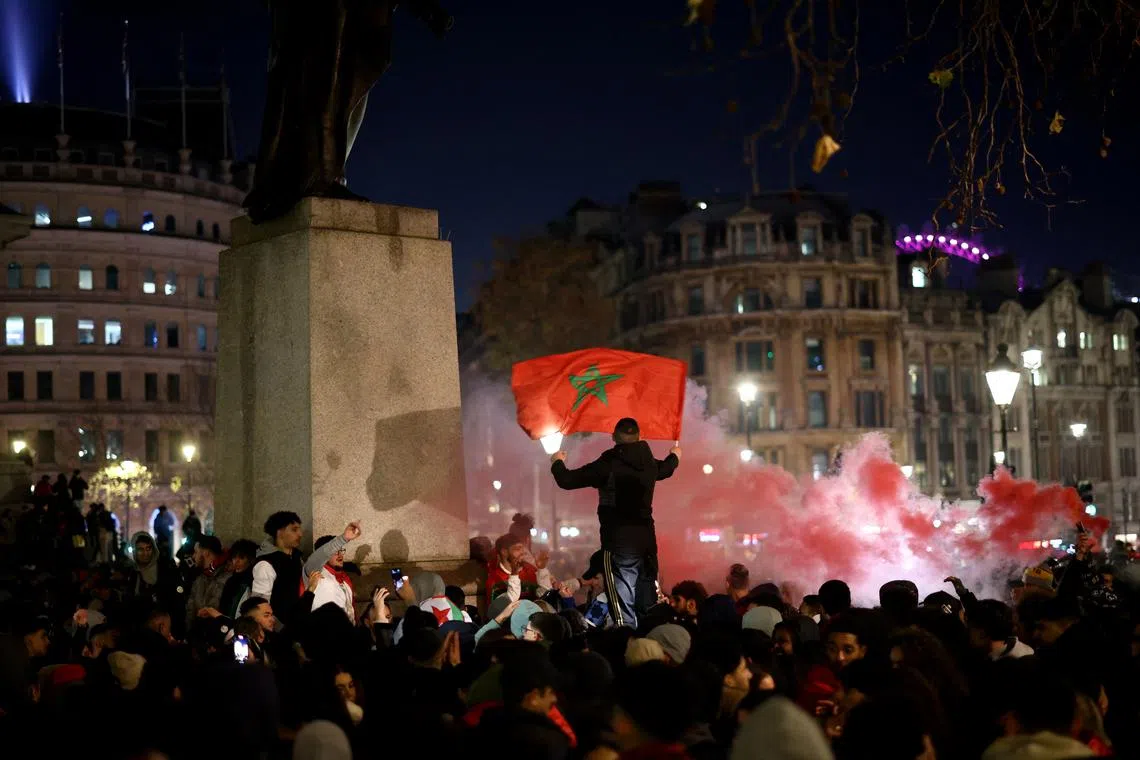Sporting Life
Overlooked Morocco have given us an invaluable gift
Sign up now: Get the biggest sports news in your inbox

As Morocco's football team ascends, so does its fans.
PHOTO: REUTERS
Follow topic:
This much we know, the underdogs in boots will run all night. The longshots from Morocco won’t stop against France. The resolute outsiders will endure. They come from North Africa, where hard journeys on foot are part of their tradition.
In the stands on Wednesday night might be sitting a Moroccan who never quit. Hicham El Guerrouj was a middle-distance mystic, who travelled a rough road from Olympic heartbreak to heroism. He fell in the 1,500m in Atlanta 1996, was overtaken right at the finish in Sydney 2000, then won the 1,500m and 5,000m gold in Athens 2004. El Guerrouj said then, “I have marked history at my moment in time”.
Now it is the footballers’ turn.
They are the overlooked, the unexpected, the revelation of this Cup. They, No. 22 in the Fifa rankings, are conquerors of Belgium (No. 2), Spain (No. 7) and Portugal (No. 9). They’re Rocky’s cousins from another continent who stubbornly refuse to know their place. But then they’re just following in formidable footsteps.
Back in 1983, Nawal El Moutawakel, daughter of a judoka and a volleyball player from Casablanca, went to study at Iowa State University. Her father Mohamed, her great advocate, was killed in a car accident just after she left but no one told her for over a month as she trained. Months later the 400m hurdler from Morocco became the first African, Arab and Muslim woman to win Olympic gold.
“Ladies,” El Moutawakel reportedly said later, “with and without the veil told me I’d liberated them”. The footballers are doing their own liberating. They’re freeing their nation and region and continent from doubt and sparking a noisy love affair. Yes, they can play, they can scrap, they can even contend.
North Africans rule in squash (six of the men’s top 10 and three of women’s top five are Egyptian) and are raising a smile in tennis (Tunisia’s Ons Jabeur is world No. 2), but football is the continent’s fascination. In 1986, when Moroccan goalkeeper Zaki Badou was saving brilliantly from Karl-Heinz Rummenigge, they became the first African and Arab team to reach the round of 16. Now they’re dreaming of a final at least.
If we’re surprised by Morocco then we’re also relieved because football has become predictable. Same teams, same tired script. In club football, a handful of teams contend in England, Real Madrid and Barcelona rule Spain and three clubs (Inter Milan, Juventus, AC Milan) have dominated the last 20 years in Italy.
The World Cup has been a similarly closed club, where in 92 years the winners have come from only two continents and till this Cup only one Asian team and no African team had reached the semi-finals. Merit is the essence of sport but this has made for a lopsided history.
And so Morocco’s feat has been overdue, refreshing and valuable. They haven’t merely knocked, they’ve kicked down the door to the Cup’s inner sanctum and sent ripples of hope across the African landscape.
What power does sport have, people wonder, and Morocco has shown us. A feat binds folks, unleashes joy, stirs belief, lifts the gloom and kindles possibility. It might have a temporary beauty, like a star scorching across the sky and disappearing, or perhaps something meaningful will take root.
We shall see, for the underdog’s adventure is unfinished. A superior, polished, Mbappe-powered France awaits but as El Moutawakel would tell her compatriots, it’s not about the enormity of the challenge but the size of their dream.
In 1984, after all, she cleared every obstacle. And she’s only 154cm.


